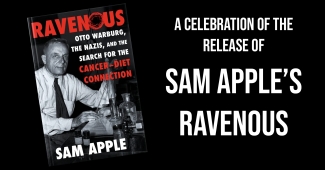Event
A CELEBRATION OF RAVENOUS BY SAM APPLE
sponsored by: the Wexler Fund for Jewish Life and Culture
Sam Apple

In Ravenous, Sam Apple reclaims Otto Warburg as a forgotten, morally compromised genius who pursued cancer single-mindedly even as Europe disintegrated around him. While the vast majority of Jewish scientists fled Germany in the anxious years leading up to World War II, Warburg remained in Berlin, working under the watchful eye of the dictatorship. With the Nazis goose-stepping their way across Europe, systematically rounding up and murdering millions of Jews, Warburg awoke each morning in an elegant, antiques-filled home and rode horses with his partner, Jacob Heiss, before delving into his research at the Kaiser Wilhelm Society.
Hitler and other Nazi leaders, Apple shows, were deeply troubled by skyrocketing cancer rates across the Western world, viewing cancer as an existential threat akin to Judaism or homosexuality. Ironically, they viewed Warburg as Germany's best chance of survival. Setting Warburg's work against an absorbing history of cancer science, Apple follows him as he arrives at his central belief that cancer is a problem of metabolism. Though Warburg's metabolic approach to cancer was considered groundbreaking, his work was soon eclipsed in the early postwar era, after the discovery of the structure of DNA set off a search for the genetic origins of cancer.
Remarkably, Warburg's theory has undergone a resurgence in our own time, as scientists have begun to investigate the dangers of sugar and the link between obesity and cancer, finding that the way we eat can influence how cancer cells take up nutrients and grow. Rooting his revelations in extensive archival research as well as dozens of interviews with today's leading cancer authorities, Apple demonstrates how Warburg's mid-century work may well hold the secret to why cancer became so common in the modern world and how we can reverse the trend. A tale of scientific discovery, personal peril, and the race to end a disastrous disease, Ravenous would be the stuff of the most inventive fiction were it not, in fact, true.
SAM APPLE teaches creative writing at the University of Pennsylvania and is on the faculty of the MA in Science Writing and MA in Writing programs at Johns Hopkins. Apple has published shorts stories, personal essays, satires, and journalistic features on a wide range of topics. In recent years, he has primarily written about science and health. His work has appeared in The New York Times Magazine, The Atlantic, Wired, McSweeney's, and NewYorker.com, among many other publications. Apple's first book, Schlepping Through the Alps, was a finalist for the PEN America Award for a first work of nonfiction. His most recent book is Ravenous.
